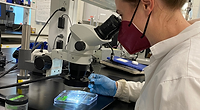Australian Study Suggests Plastic Pollution in Seafood

Flinders University researchers are warning the global community about the possibility of plastic contamination in human food supplies, based on their findings from a recent study of South Australian mussels. The research team sampled blue mussels, a species that is indicative of ecosystem health due to its susceptibility to surrounding conditions, for the presence of microplastics particles. Microplastics are plastic particles that are less than 5 millimeters in size and are human-caused pollutants, often found in marine and fresh waters.
Conclusions drawn from the study’s findings include:
- Microplastics are ubiquitous in South Australian intertidal waters
- Microplastics concentration in the water is higher in areas where human coastal populations are larger
- Microplastics levels in wild mussels are affected by the size of the mussels, but not the concentration of microplastics in the water
- Microplastics contamination is caused by single-use plastics, the fishing industry, and textiles.
The study’s authors note that the microplastics load in mussels implies the presence of such pollutants in seafood consumed by humans. The state of South Australia, where the study was conducted, is a hub for shipping and fishing, and contains biodiversity hotspots of global significance. The issue is not exclusive to Australia, however, as trillions of microplastics particles exist in oceans around the world. The Flinders University research team expects microplastics pollution to increase in the future.
Looking for a reprint of this article?
From high-res PDFs to custom plaques, order your copy today!







